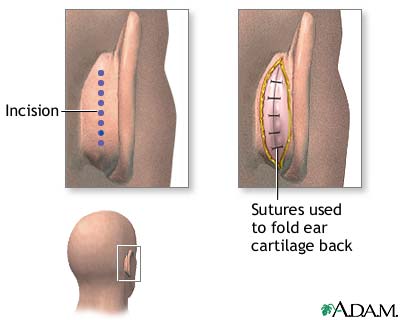Ear surgery - series
Procedure

Thousands of ear surgeries (otoplasties) are performed successfully each year. The surgery may be done in the surgeon's office-based facility, in an outpatient surgical facility, or in a hospital. The surgery is performed while the patient is awake but pain free (local anesthetic) or deep asleep and pain free (general anesthetic). The procedure usually lasts about two hours, depending on the extent of the correction needed.
The most commonly employed technique is one in which the surgeon makes incisions in the back of the ear and removes skin to expose the ear cartilage. Sutures are used to fold the cartilage to reshape the ear.
Other surgeons choose to forgo sutures in favor of cutting or abrading the cartilage before folding it.
The ear is brought closer to the head by creating a more pronounced fold (called the antihelix) in the central portion of the ear.
Update Date: 11/16/2011
Updated by: David A. Lickstein, MD, FACS, specializing in cosmetic and reconstructive plastic surgery, Palm Beach Gardens, FL. Review provided by VeriMed Healthcare Network. Also reviewed by David Zieve, MD, MHA, Medical Director, A.D.A.M., Inc.
Related Pages
Notice: The information provided herein should not be used during any medical emergency or for the diagnosis or treatment of any medical condition. A licensed physician should be consulted for diagnosis and treatment of any and all medical conditions. Call 911 for all medical emergencies. Links to other sites are provided for information only -- they do not constitute endorsements of those other sites. Copyright 1997-2012, A.D.A.M., Inc. Any duplication or distribution of the information contained herein is strictly prohibited.
